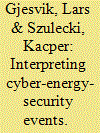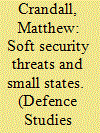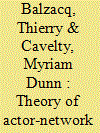|
|
|
Sort Order |
|
|
|
Items / Page
|
|
|
|
|
|
|
| Srl | Item |
| 1 |
ID:
190061


|
|
|
|
|
| Summary/Abstract |
The digitalisation of the energy system brings out the question of cyber threats. How this area is perceived and how cyber-security policy in the energy sector develops is driven by the most spectacular cyber-incidents. How do these events shape public perceptions about the dangers of digitalisation? To understand this, we look at the 2016 CrashOverride cyberattack on Ukraine’s grid. Hypothesising that cyber-energy security incidents are interpreted in the context of socio-technical imaginaries of the energy sector and security imaginaries linked to foreign policy, we distil four discourses that emerged around the Ukraine attack among Western experts and commentators. One represented it as evidence of an accelerating race towards disaster, another as merely a tip of the iceberg. The third portrayed it as less catastrophic than initially suggested, while the last one as part of Russia’s cyber strategy. Not all of these were picked up by the broader public debate in Western security circles, and only the more alarmist discourses had a visible impact beyond niche communities.
|
|
|
|
|
|
|
|
|
|
|
|
|
|
|
|
| 2 |
ID:
128950


|
|
|
|
|
| Publication |
2014.
|
| Summary/Abstract |
This article will attempt to establish what is the relationship between domestic and international strategies taken by small states. To do this, Estonia will be used as a case study to examine how it has reacted to cyber-security, energy security, and national identity security. This work will take a qualitative critical approach that transcends common ontologies and epistemologies in International Relations. This will enable us to look at the relationship between levels of analysis, not just compartmentalize and compare them. A wide use of academic sources, open Estonian documents (both governmental and non-governmental), as well a semi-structured interview with an official of the Ministry of Defense will be used. This article concludes that small States will need to use all their resources, on both the domestic and international levels, to be successful in facing soft security.
|
|
|
|
|
|
|
|
|
|
|
|
|
|
|
|
| 3 |
ID:
145672


|
|
|
|
|
| Summary/Abstract |
This article argues that some core tenets of Actor-Network Theory (ANT) can serve as heuristics for a better understanding of what the stakes of cyber-security are, how it operates, and how it fails. Despite the centrality of cyber-incidents in the cyber-security discourse, researchers have yet to understand their link to, and affects on politics. We close this gap by combining ANT insights with an empirical examination of a prominent cyber-incident (Stuxnet). We demonstrate that the disruptive practices of cyber-security caused by malicious software (malware), lie in their ability to actively perform three kinds of space (regions, networks, and fluids), each activating different types of political interventions. The article posits that the fluidity of malware challenges the consistency of networks and the sovereign boundaries set by regions, and paradoxically, leads to a forceful re-enactment of them. In this respect, the conceptualisation of fluidity as an overarching threat accounts for multiple policy responses and practices in cyber-security as well as attempts to (re-)establish territoriality and borders in the virtual realm. While this article concentrates on cyber-security, its underlying ambition is to indicate concretely how scholars can profitably engage ANT’s concepts and methodologies.
|
|
|
|
|
|
|
|
|
|
|
|
|
|
|
|
|
|
|
|
|